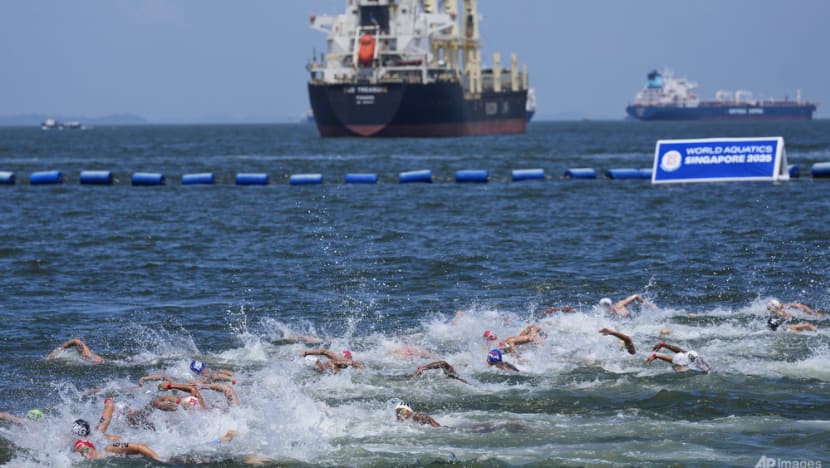Sports
Competitors Endure Challenging Conditions at World Aquatics Championships

The men’s 10km open water race at the World Aquatics Championships in Sentosa, Singapore, on July 16, 2023, presented competitors with intense challenges, primarily due to extreme heat and choppy water conditions. The race concluded with Germany’s Florian Wellbrock taking the gold medal, while Italy’s Gregorio Paltrinieri secured silver, and Australia’s Kyle Lee clinched bronze. A total of 11 participants, including Singapore’s Ritchie Oh, were unable to finish the race, highlighting the difficulties faced by competitors.
The race’s completion rate starkly contrasts with the previous World Championships in Doha, where only one competitor failed to finish. The race in Sentosa saw three athletes not starting, and five others exceeding the designated time limit. The official water temperature during the race measured at a challenging 30.4 degrees Celsius, which is at the upper limit set by World Aquatics regulations, which stipulate that open water swimming temperatures must range from a minimum of 16 degrees Celsius to a maximum of 31 degrees Celsius.
Wellbrock, the reigning Olympic champion, remarked on the exceptionally tough conditions, stating, “To be honest, it was tough today… I think it was the warmest water ever that we’ve had to race in.” This victory marks his third world title in open water swimming, following previous wins in 2019 and 2023. He credited extensive heat training as pivotal to his success in the demanding environment.
Hungary’s Kristof Rasovszky, who is both the reigning champion and Olympic gold medalist, described the race as one of the most challenging he has faced. He noted that the conditions were difficult for all competitors, emphasizing, “It’s a really challenging experience… everyone had to swim in the same conditions.” Rasovszky recalled a similar warm-water experience during the 2019 Beach Games in Doha, reinforcing the unpredictability inherent in open water events.
Singapore’s Artyom Lukasevits, who finished 43rd, highlighted multiple factors contributing to the race’s difficulty, including the choppy waters and the overall intensity of competition. He stated, “It’s one of the hottest, if not the hottest ever. And everybody’s just kind of fighting for their life, so it’s really difficult.” Despite the harsh conditions, Lukasevits emerged as the best-placed Southeast Asian competitor.
Postponements and Water Quality Concerns
The women’s 10km race faced postponement just hours before its scheduled start due to water quality concerns. Organizers indicated that samples taken prior to the event showed elevated levels of E. coli bacteria, prompting the decision to delay the race. Originally set for 08:00 on Tuesday, the event was moved first to Wednesday morning, and ultimately to the afternoon.
World Aquatics executive director Brent Nowicki confirmed that the contamination source remains unidentified, but emphasized the importance of maintaining athlete safety. E. coli bacteria are commonly found in the intestines of humans and animals, and exposure to pathogenic strains can lead to serious gastrointestinal symptoms.
By Wednesday morning, officials announced a significant improvement in water quality, allowing both the men’s and women’s races to proceed later in the day. Testing indicated E. coli levels had fallen within acceptable ranges as outlined by World Aquatics and the World Health Organization.
Regular monitoring and testing will continue throughout the championships to ensure athlete safety, with the health of all participants prioritized in competition decisions. Rasovszky acknowledged the impact of the postponement on preparation, stating, “We didn’t know in the morning when we woke up if there’s going to be a race or not… it’s not really good for the preparation like a day before the race.”
Lukasevits remarked on the unpredictability of open water events, saying, “We have to expect unexpected things to happen; it’s part of the sport.”
Indonesia’s Aflah Prawira expressed support for the postponement decision, noting, “It’s one of the hardest courses I’ve ever swum. It’s the weather—the heat from the outside, the choppy water… very difficult race also because we started in the afternoon.” He acknowledged the challenges faced by all competitors but recognized the necessity of prioritizing safety in such conditions.
As the championships progress, the focus remains on ensuring the well-being of athletes while providing a platform for high-level competition in open water swimming.
-

 Business5 months ago
Business5 months agoKenvue Dismisses CEO Thibaut Mongon as Strategic Review Advances
-

 Lifestyle4 months ago
Lifestyle4 months agoHumanism Camp Engages 250 Youths in Summer Fest 2025
-

 Sports4 months ago
Sports4 months agoDe Minaur Triumphs at Washington Open After Thrilling Comeback
-

 Sports5 months ago
Sports5 months agoTupou and Daugunu Join First Nations Squad for Lions Clash
-

 Top Stories5 months ago
Top Stories5 months agoColombian Senator Miguel Uribe Shows Signs of Recovery After Attack
-

 World5 months ago
World5 months agoASEAN Gears Up for Historic Joint Meeting of Foreign and Economic Ministers
-

 Health4 months ago
Health4 months agoNew Study Challenges Assumptions About Aging and Inflammation
-

 Business5 months ago
Business5 months agoOil Prices Surge Following New EU Sanctions on Russia
-

 Entertainment4 months ago
Entertainment4 months agoDetaşe-Sabah Violin Ensemble Captivates at Gabala Music Festival
-

 Entertainment4 months ago
Entertainment4 months agoBaku Metro Extends Hours for Justin Timberlake Concert
-

 Top Stories5 months ago
Top Stories5 months agoRethinking Singapore’s F&B Regulations Amid Business Closures
-

 Business5 months ago
Business5 months agoU.S. House Approves Stablecoin Bill, Sends to Trump for Signature









